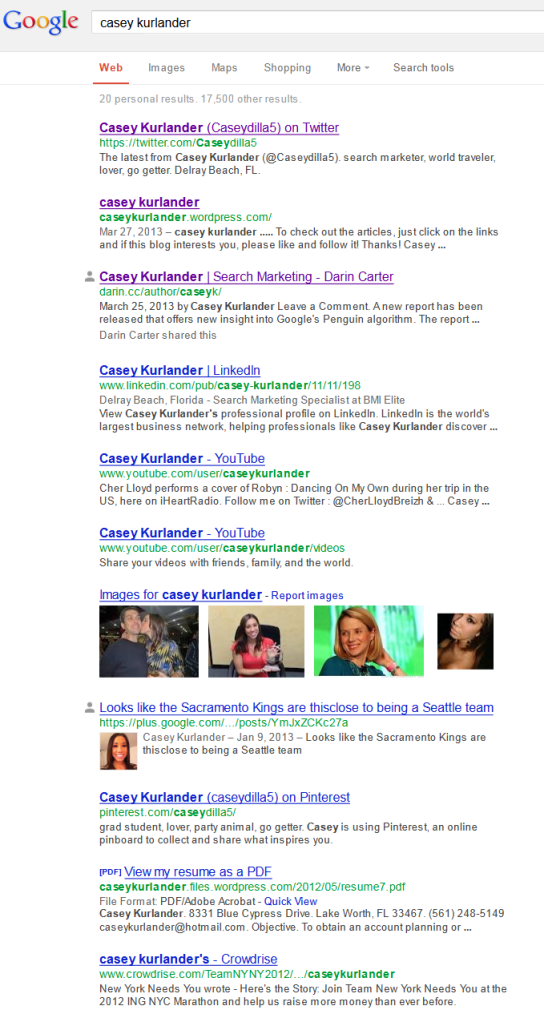The internet marketing agency that I work for has been looking to hire an SEO/PPC specialist for a few weeks now, but we’re having a hard time finding the right person. We’ve been posting ads and getting a decent amount of responses, but not too many people are qualified enough for what we’re looking for.
Today I received the resume of a person who seemed to have just the right amount of work experience and knowledge. Before I attempted to schedule an interview I decided to Google his name and see what comes up. There was the usual- links to his LinkedIn, Twitter, Google+ and Pinterest accounts (which always rank high), his blog, a popular SEO site that he’s probably mentioned on and his mug shot. Wait, mug shot?
Guess who just missed out on a job opportunity. Especially being a search marketing professional and all, the least I expected from the guy was to have a clean online reputation.
At least once in your life, someone important will look you up on Google. There’s a good chance it’s already happened, as search insiders estimate that that non-celebrity people searches account for more than 10% of Google’s search volume.
Admit it; you’ve Googled yourself at least once just to see what came up. But who else has? Recruiters and hiring managers will likely look you up on search engines before offering you an interview or job. Colleges have been known to look up students before accepting them. In my single days I wouldn’t go on a date without Googling the guy first.
Having a person Google your name is something that’s going to happen (again) in your life. If there’s something negative that might come up and hurt you, it’s up to you to fix it. Here are four easy things you can do to manage your online reputation.
Google Yourself
If you haven’t done this already, start by going to Google and typing in your name. Make sure you’re logged out of Google so you see standard results rather than personalized ones. Consider the first page of search results for your name your own personal home page. Studies show that about 75% of search engine users never click past the first page, so it’s extremely important to use that real estate to your full advantage. If you have a common name and share it with some scandalous characters, I would start using a middle name or initial on job applications, your resume and social media sites.
Own Your Name
The term “own your name” refers to “owning” all of the domains that come up in the search results. I’m lucky- there are no other Casey Kurlanders in the world that I know of, so I don’t have any competition. But if you look, every search result on the first page for my name is something that I created and pretty much have control over.
Here are some tips on how to own the first page of results for your name:
- Get your Linkedin profile to show up first by making sure you have a custom URL with your name. For example, my LinkedIn URL is www.linkedin.com/in/caseykurlander/ and it always ranks high because the URL matches the keyword searched and LinkedIn has high SEO authority. To create your own custom LinkedIn URL, go to the “edit profile” section and it’s right there.
- Google-owned properties like Picasa, YouTube and Google+ often rank high, so make sure to utilize them using your name. Google+ is great because it’s free and it offers lots of options for providing links, photos, and information you may want to highlight
- Start a blog and make your name the title. Also make sure that your name is in the URL. I recommend using WordPress, as it’s the blogging platform that seems to rank the highest. It’s also free and extremely easy to use.
- Be mindful of what you use as your default photos on Twitter, Google+ and LinkedIn- those also rank high and are often one of the first to show up in Google Images. This also applies to photos that you post on your blog, as many of them will come up.
Fight back!
Depending on the website, the instructions for removing or hiding results vary. However, information that’s been indexed in Google’s database cannot be extracted from Google search results. Google has ownership of its database and will not act on negative publicity. Even if the offending article is removed by the publisher, the content still exists in Google’s database and could be found in a search.
One of the places that you can fight back is Facebook. There you can mark specific content as public or with varying levels of privacy. To protect yourself, it is best to keep Facebook content limited to friends only. If your online reputation is really bad, you can always give us a call at BMI Elite to remove negative or undesired content associated with your name.
Prevention
The best defense is a great offense- don’t wait until there’s something negative in the search results to improve your online reputation. A great defense strategy is to have an abundance of positive content on the first page of results. Go ahead and tweet, post, comment and blog!
